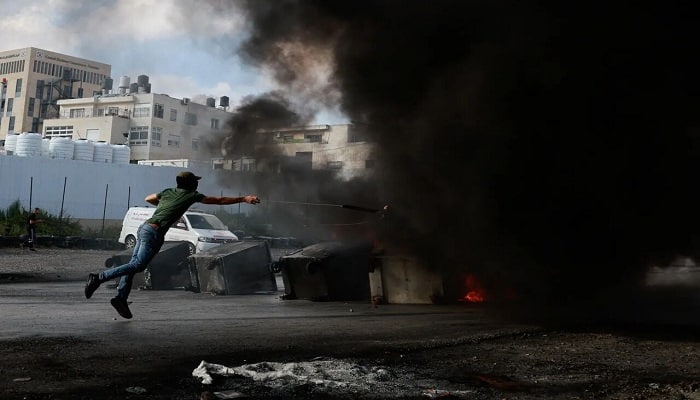PNN – In a note, referring to the situation caused by the Al-Aqsa storm operation in the West Bank, the question “Has Hamas launched the third intifada?” examines.
According to Pakistan News Network, in this note written by Daniel Beeman, it is stated that Israel is currently carrying out attacks in the Gaza Strip. Its forces are attacking and conducting airstrikes, which have killed more than 5,000 Palestinians so far. But while Tel Aviv’s war with Hamas intensifies, this regime faces another dangerous crisis. The war in Gaza is spreading to the West Bank and could trigger a third intifada.
It is stated in this report: Following the October 14 Israeli attacks on Al-Mohamedani Hospital in Gaza, protest marches were launched in Jenin, Nablus, Ramallah, Tubas and other large cities of the West Bank. Palestinians also declared a general strike across the West Bank, and Israeli settlers launched attacks on Palestinians. More than 90 Palestinians died in these attacks in the West Bank until the morning of October 22. The Palestinian Authority, which governs the West Bank, has created difficult conditions to control the situation, and its measures to establish peace have in some way harmed the legitimacy of Mahmoud Abbas, the head of the Palestinian Authority.
According to the author, the uprising in the West Bank for Washington only exacerbates the challenges posed by the war in Gaza and further demonstrates how the Palestinian-Israeli conflict remains unresolved.
Read more:
The Zionist army’s fear of exposing the lie “Hamas is ISIS!”
Resistance or cooperation
In the continuation of this article, it is stated as follows: Mahmoud Abbas took over the leadership of the Palestinian Authority after the death of Yasser Arafat in 2004. This transition took place during the second intifada (from 2000 to 2005) and gradually ended. However, Arafat viewed Hamas as a weapon against Israel and gave the organization more room to operate when putting pressure on Tel Aviv. But Hamas soon became a powerful organization that was no longer able to be controlled. During the second intifada, this group gained considerable credibility by carrying out repeated operations against Israel, while the self-governing organization was struggling with corruption and internal discord.
The Palestinians believed that Israel was committed to the occupation and peaceful annexation of the West Bank. When Israel pulled out of Gaza in 2005, it did so as a deliberate gesture of fragile sanctity and without consulting Mahmoud Abbas or other Palestinian peace leaders. As a result, Hamas gained credibility and believed that the threat of unending violence, not negotiations, was what drove Israel to withdraw. The respect that Hamas earned for its operations and history helped it win the 2006 elections in Gaza, and then take power in the Gaza Strip in 2007 after clashes with the Palestinian Authority.
Since then, Gaza is governed only by Hamas, while the United States and other countries did not recognize it as a government. Since the Palestinian Authority saw Hamas as a rival, it cooperated with Israel against this movement. Arab countries, especially Qatar and Turkey, often tried to help Hamas, but other countries, including neighboring Egypt, considered this group a potential threat due to its connection with the Muslim Brotherhood movement. Therefore, Israel’s economic pressure and regular military campaigns due to the strong roots of Hamas in Gaza did not cause this group to slip. The existing chaotic situation was maintained; That is, the self-governing organization of the West Bank and the guardian of Hamas in Gaza.
The leaders of the Palestinian Authority were worried about the popularity of Hamas among the Palestinians, especially during crises like the current one, when Hamas is at the center of the Palestinian issue. Human rights organizations stated that the self-governing administration uses torture, beatings and unjustified arrests to suppress the uprising of Hamas supporters. According to the National Security Studies Institute of Tel Aviv University, self-governing organizations even threaten the family members of political opponents. The self-governing organization has many opponents; Many Palestinians see it as a proxy force for the Israeli occupation. For those living in the occupied West Bank, the choice between Hamas’s combativeness and cooperation with the self-governing organizations is an easy option.
The situation in the West Bank was very sensitive even before the Al-Aqsa storm operation and easily susceptible to any unrest and war. The anger of the Palestinians against the endless Israeli occupation, the expansion of settlements and the plans of the Israeli settlers had reached its peak. The current year was assessed as deadlier than 2022, which was the deadliest year. While more Palestinians are killed during Israeli military operations in Gaza, unrest in the West Bank is likely to continue and Zionist violence will increase. The result will be a dangerous vicious circle.
Such a cycle only serves to further strengthen the position and capabilities of Hamas, as the al-Aqsa storm did. Therefore, the scale and scope of this operation caused a great shock to Israel and without a doubt it dealt a blow to Tel Aviv’s credibility and aura of invincibility. Palestinians probably feel proud that Israel is in pain and cannot ignore the Palestinian cause. Palestinians and other anti-Israel groups consider these to be “resistance”, something that has been and is a long-standing tradition among Palestinians.

